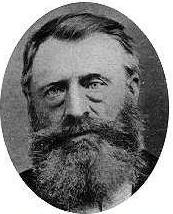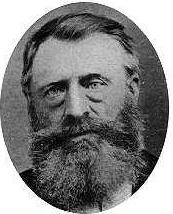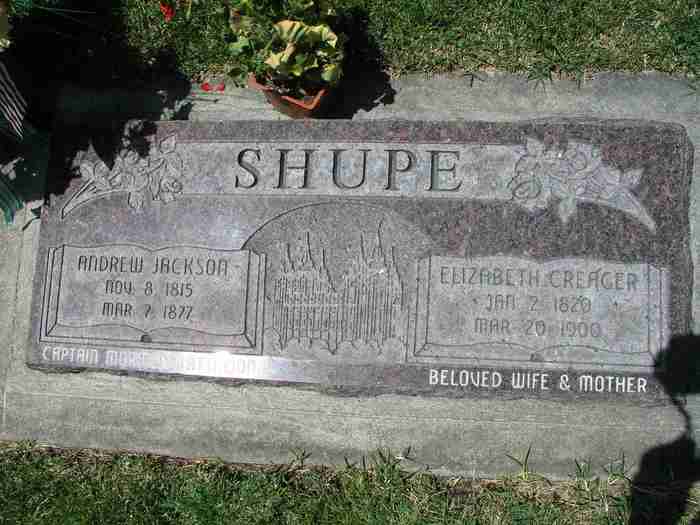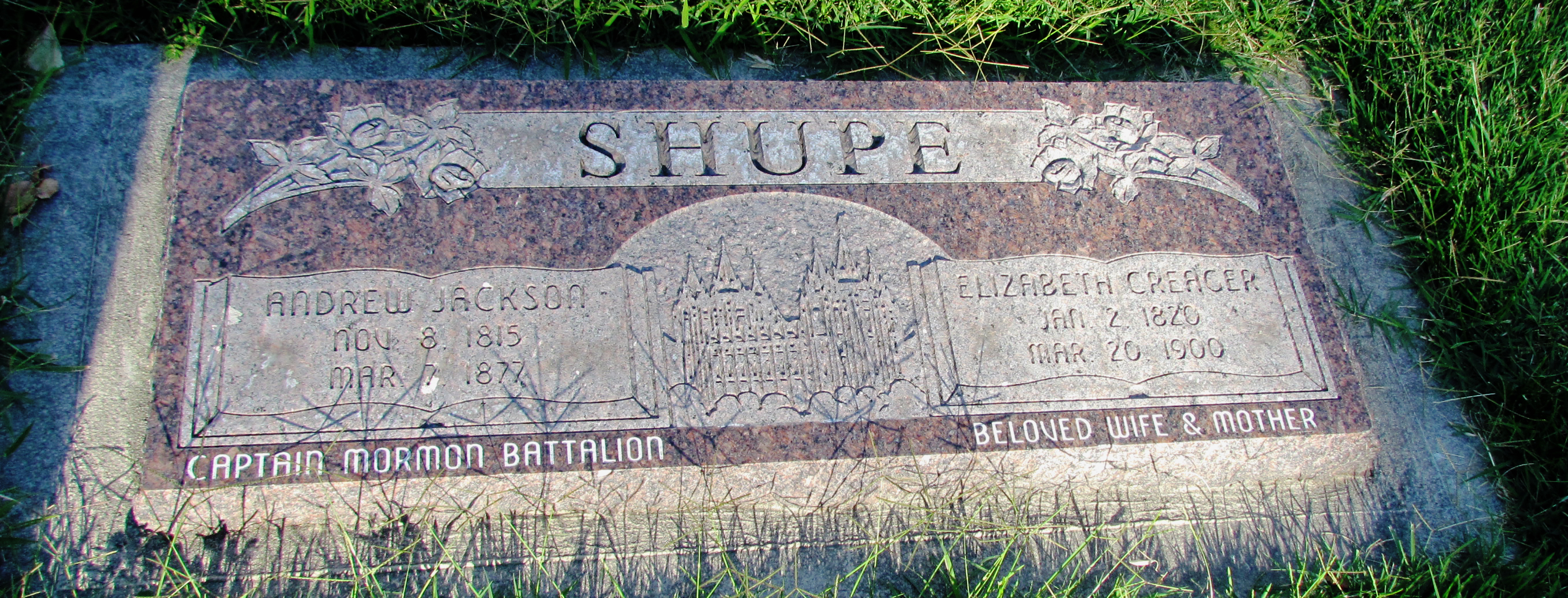Married Elizabeth Creager, 12 Oct 1837, Wythe County, Virginia
Children - Andrew Jackson Shupe, Peter Riley Shupe, Brigham Kendrick Shupe, Emma Elizabeth Shupe, James Michael Shupe, Rosanna Minerva Shupe, Mary Elizabeth Shupe, Isaac Shupe, Louisa Maria Shupe, John Whetstein Shupe, David Kendrick Shupe, Sarah Jane Shupe, Darthula Catherine Shupe
In the spring of 1841, Andrew was baptized into the Church of Jesus Christ of Latter-day Saints and two years later left Virginia to unite with the Saints in Nauvoo, Illinois to contribute his share to that epoch of Mormon history. Andrew enlisted in the Mormon Battalion, Company "C," while at Council Bluffs. On Wednesday, the 5th of August, 1846 he was given arms and ammunition and appointed to drive a team of six mules that had never been in a harness before. Andrew sent $25.00 of the first $42.00 he received to his wife and four children who were living in a covered wagon.
While crossing a river the tongue of his wagon broke and the wagon was left in the middle of the stream. Before a rescue could be initiated the clouds opened up with a torrent of rain; then lightning and thunder harassed the rain-soaked band of men who found shelter only under the stars when they saw fit to shine. Three days later a wagon tongue was cut and hewn to fit, and travel was continued. Toward night a great mass of black clouds gave warning of another violent storm. Quoting from Andrew Shupe's written words: "I was in the back end of my tent and the rain came through the tent as if it weren't there, and it blew down in spite of us all. The boys got out and left the tent but it wrapped itself around me so that I could not get out for some time. The wind carried me about two or three yards and I finally got my head out, looked up and saw that all the tents were blown down and left in the rain. A young man by the name of Bailey saw that I had the tent over my head and he came to me and got under the tent with me and the hailstones began to beat upon us so that we could scarcely stand to hold the tent over us. It was the most serious time that I ever saw in my life. It took one man across the encampment and left him against a wagon."
One spot in the travels was through a wooded area and, with the relish of starving jackals, they pounced on the wood lying loose among the timber, because, here again, was warmth and fuel for cooking. Loaded wagons were "chinked" even tighter. Some buffalo were killed and renewed life was given to the travelers' bodies, but the cattle and mules were close to starving because the prairie was barren. It was ever thus—always a spring, a buffalo, some wood a reward at the end of each tolerable incident, like the proverbial pot at the end of the rainbow. Dry throats never gave up because always somewhere along the trail they would find the answer to their needs.
One night, at dusk, two Spaniards, a man and a woman, came into camp. They lived four miles away and had brought goats' milk bread and cheese to sell. The next day the travelers visited the valley in the mountains where these people lived. Sheep and goats dotted the green grass and the men were given their fill of warm bread and milk.
At the time the Battalion was divided and the soldiers who were ill sent to Pueblo, Andrew was among that group. Weeks went by and no orders came for the men to leave. Time hung heavily on their hands. Andrew shot buffalo and deer and sent them back to camp. On one hunting trip he came to a spring that, as he wrote, "Run pure soda. It was the greatest curiosity that I have ever beheld. The water boiled up with considerable force and was clear with but little run off. The water was pronounced by all who drank of it to be as good or [p.496]better than any prepared by chemistry. It was very sharp and sweet and had an acid taste also." On another hunting expedition he was in sight of Pike's Peak and the effect was deep and lasting.
On May 18th orders came to march to California. The trek was marred with bad news when men from the Church met the company. Andrew Shupe received a letter from his wife stating that his father, mother and brother had died. The march continued on to Wyoming. Leaving Laramie, with others, on horseback, headed by Thomas H. S. Williams, Andrew was sent to look for horses that had strayed. These men overtook the pioneers at Green River and came into the Valley with the original company of pioneers.
Mr. Shupe returned to Winter Quarters to find his family whom he had not seen since joining the Battalion. He found them well but in rather poor circumstances. On the 12th of June, 1848 they started for the Valley and arrived in Salt Lake in the month of September. After living in Salt Lake City for a month, the family moved to Ogden where they made their permanent home. — Anna Russell
Andrew Jackson Shupe Tribute
Mormon Pioneer Overland Travel, Mormon Battalion Sick Detachments (1847)
Mormon Pioneer Overland Travel, Isaac M. Stewart Company (1852)
Married Elizabeth Creager, 12 Oct 1837, Wythe County, Virginia
Children - Andrew Jackson Shupe, Peter Riley Shupe, Brigham Kendrick Shupe, Emma Elizabeth Shupe, James Michael Shupe, Rosanna Minerva Shupe, Mary Elizabeth Shupe, Isaac Shupe, Louisa Maria Shupe, John Whetstein Shupe, David Kendrick Shupe, Sarah Jane Shupe, Darthula Catherine Shupe
In the spring of 1841, Andrew was baptized into the Church of Jesus Christ of Latter-day Saints and two years later left Virginia to unite with the Saints in Nauvoo, Illinois to contribute his share to that epoch of Mormon history. Andrew enlisted in the Mormon Battalion, Company "C," while at Council Bluffs. On Wednesday, the 5th of August, 1846 he was given arms and ammunition and appointed to drive a team of six mules that had never been in a harness before. Andrew sent $25.00 of the first $42.00 he received to his wife and four children who were living in a covered wagon.
While crossing a river the tongue of his wagon broke and the wagon was left in the middle of the stream. Before a rescue could be initiated the clouds opened up with a torrent of rain; then lightning and thunder harassed the rain-soaked band of men who found shelter only under the stars when they saw fit to shine. Three days later a wagon tongue was cut and hewn to fit, and travel was continued. Toward night a great mass of black clouds gave warning of another violent storm. Quoting from Andrew Shupe's written words: "I was in the back end of my tent and the rain came through the tent as if it weren't there, and it blew down in spite of us all. The boys got out and left the tent but it wrapped itself around me so that I could not get out for some time. The wind carried me about two or three yards and I finally got my head out, looked up and saw that all the tents were blown down and left in the rain. A young man by the name of Bailey saw that I had the tent over my head and he came to me and got under the tent with me and the hailstones began to beat upon us so that we could scarcely stand to hold the tent over us. It was the most serious time that I ever saw in my life. It took one man across the encampment and left him against a wagon."
One spot in the travels was through a wooded area and, with the relish of starving jackals, they pounced on the wood lying loose among the timber, because, here again, was warmth and fuel for cooking. Loaded wagons were "chinked" even tighter. Some buffalo were killed and renewed life was given to the travelers' bodies, but the cattle and mules were close to starving because the prairie was barren. It was ever thus—always a spring, a buffalo, some wood a reward at the end of each tolerable incident, like the proverbial pot at the end of the rainbow. Dry throats never gave up because always somewhere along the trail they would find the answer to their needs.
One night, at dusk, two Spaniards, a man and a woman, came into camp. They lived four miles away and had brought goats' milk bread and cheese to sell. The next day the travelers visited the valley in the mountains where these people lived. Sheep and goats dotted the green grass and the men were given their fill of warm bread and milk.
At the time the Battalion was divided and the soldiers who were ill sent to Pueblo, Andrew was among that group. Weeks went by and no orders came for the men to leave. Time hung heavily on their hands. Andrew shot buffalo and deer and sent them back to camp. On one hunting trip he came to a spring that, as he wrote, "Run pure soda. It was the greatest curiosity that I have ever beheld. The water boiled up with considerable force and was clear with but little run off. The water was pronounced by all who drank of it to be as good or [p.496]better than any prepared by chemistry. It was very sharp and sweet and had an acid taste also." On another hunting expedition he was in sight of Pike's Peak and the effect was deep and lasting.
On May 18th orders came to march to California. The trek was marred with bad news when men from the Church met the company. Andrew Shupe received a letter from his wife stating that his father, mother and brother had died. The march continued on to Wyoming. Leaving Laramie, with others, on horseback, headed by Thomas H. S. Williams, Andrew was sent to look for horses that had strayed. These men overtook the pioneers at Green River and came into the Valley with the original company of pioneers.
Mr. Shupe returned to Winter Quarters to find his family whom he had not seen since joining the Battalion. He found them well but in rather poor circumstances. On the 12th of June, 1848 they started for the Valley and arrived in Salt Lake in the month of September. After living in Salt Lake City for a month, the family moved to Ogden where they made their permanent home. — Anna Russell
Andrew Jackson Shupe Tribute
Mormon Pioneer Overland Travel, Mormon Battalion Sick Detachments (1847)
Mormon Pioneer Overland Travel, Isaac M. Stewart Company (1852)
Family Members
-
Catharine Shupe Tibbs
1817–1840
-
John Whitstein Shupe
1819–1847
-
Thirza Shupe
1821 – unknown
-
![]()
Pvt James Wright Shupe
1823–1899
-
![]()
William Kendrick Shupe
1824–1904
-
![]()
Elizabeth "Eliza" Shupe Howard
1826–1899
-
![]()
Isaac Benjamin Shupe
1826–1896
-
George Eldridge Shupe
1828–1846
-
![]()
Peter Riley Shupe
1831–1899
-
Polly Ann Shupe
1832–1832
-
Susannah Shupe
1832–1847
-
Mailinah Shupe
1834–1838
-
Benjamin Franklin Shupe
1837–1846
-
Nancy Malinda Shupe
1838–1847
-
![]()
Darthula Catherine Shupe Stephens
1837–1911
-
![]()
John Whetstein Shupe
1840–1910
-
![]()
Brigham Kendrick Shupe
1845–1879
-
![]()
Mary Elizabeth Shupe Higginbotham
1848–1910
-
![]()
Louisa Maria Shupe Southwick
1850–1908
-
![]()
Andrew Jackson Shupe
1853–1915
-
![]()
Peter Riley Shupe
1855–1914
-
![]()
James Michael Shupe
1857–1914
-
![]()
Sarah Jane Shupe Taylor
1859–1914
-
![]()
Isaac Shupe
1862–1920
-
![]()
Emma Elizabeth Shupe Harris
1870–1914
Advertisement
Explore more
Sponsored by Ancestry
Advertisement





















